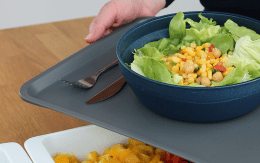What was it like to be part of the first ever New European Bauhaus Booster?

The New European Bauhaus (NEB) movement aims to foster sustainable transformation across Europe, where quality of experience of buildings and public space is accessible to all and ideas to challenge the status quo are uplifted and experimented with. Vital to making this vision a reality are start-ups, particularly those working in the social innovation space, who can respond to the needs of users and work flexibly to bring exciting projects to communities.
With hopes of activating this community, the EIT Community New European Bauhaus ran a booster call last year to support innovative ventures driving these changes across cities, industries, climate, food and wellbeing. The programme aimed to support business growth through funding of up to 10,000 EUR, as well as access to tailored support for each business through hand-picked mentors. The booster was run by the European innovation communities of EIT Digital, Climate KIC, EIT Food, EIT Manufacturing and EIT Urban Mobility.
So what was it like to be part of the inaugural NEB Booster? We caught up with three of our partners to hear about their experiences.
Not just money
Geoffrey Eberle, Founder and Partner of Entropic & NEST fabrication, talks about the shift he hopes to make towards ‘regenerative design’ rather than just reducing the impact of current construction work: “A lot of the focus in architecture and building is on reducing the carbon output of existing projects but we’re really interested in making the environment better by building”. Their project, NEST, is a solution that makes use of abundant vertical spaces in cities to increase biodiversity in cities. They design tailored panels that will allow the growth of plants or places to nest for, while maintaining the high performance of the building and a healthier micro-climate.

NEST tiles from Entropic could be the future of regenerative living. Credit: Entropic
Eberle talked about how important the New European Bauhaus booster programme was for helping turn the idea into a real-life business and for also steering it in the right direction. “If the programme had only been about getting money, we wouldn’t have spent it in the best way. Having the education and coaching was fundamental to us making the right choices early on”, said Eberle.
Dedicated support
One of the most unique aspects of the programme is the dedicated mentor or coach given to each start-up to support their journey and work with them to make the right choices that will help to expand and grow the ideas. Fredrik Karlberg is the founder of Jonna, a bike subscription service set up in Sweden to get more people biking and to make biking the norm. Karlberg highlighted that alongside the funding, their mentor was vital to expanding their work: “having clear deadlines and someone to respond to helped to keep us on track”.
Karlberg and his team at Jonna are moving beyond the world of bike subscriptions into the market of servicing and selling second-hand e-bikes and he noted the value of having been through a European Booster in helping them build their brand to grow. “It meant a lot to us to be part of an EU programme that was recognizable to people and it helped bring validation to our project. I also felt that it helped grow my own confidence and pushed people to take us seriously and that was down to the weight of the European Institute of Technology and Innovation (EIT) brand”.

Crafting Future hope to disrupt the single-use food sector with their reusable products. Credit: Crafting Future
Being part of a community
Being part of the booster programme also allows you to meet and exchange ideas with start-ups working across Europe. For Lennart Heyner, Co-Founder of Crafting Future, tapping into the innovation ecosystem allowed you to feel part of a wider movement, all working towards one vision. “It’s great to imagine you are not alone. To exchange with other participants to understand what they are working on and see if there are opportunities to collaborate” said Heyner. Crafting Future’s vision of developing sustainable fast-food packaging relies on collaborating across industries to allow their products to see transformation. Being part of a wider EIT Community allows those connections to be made more easily and for collaboration to happen.
Calls for ideas the New European Bauhaus Booster 2.0 are now open! Find out more about the programme. Applications close March 13 2023.

